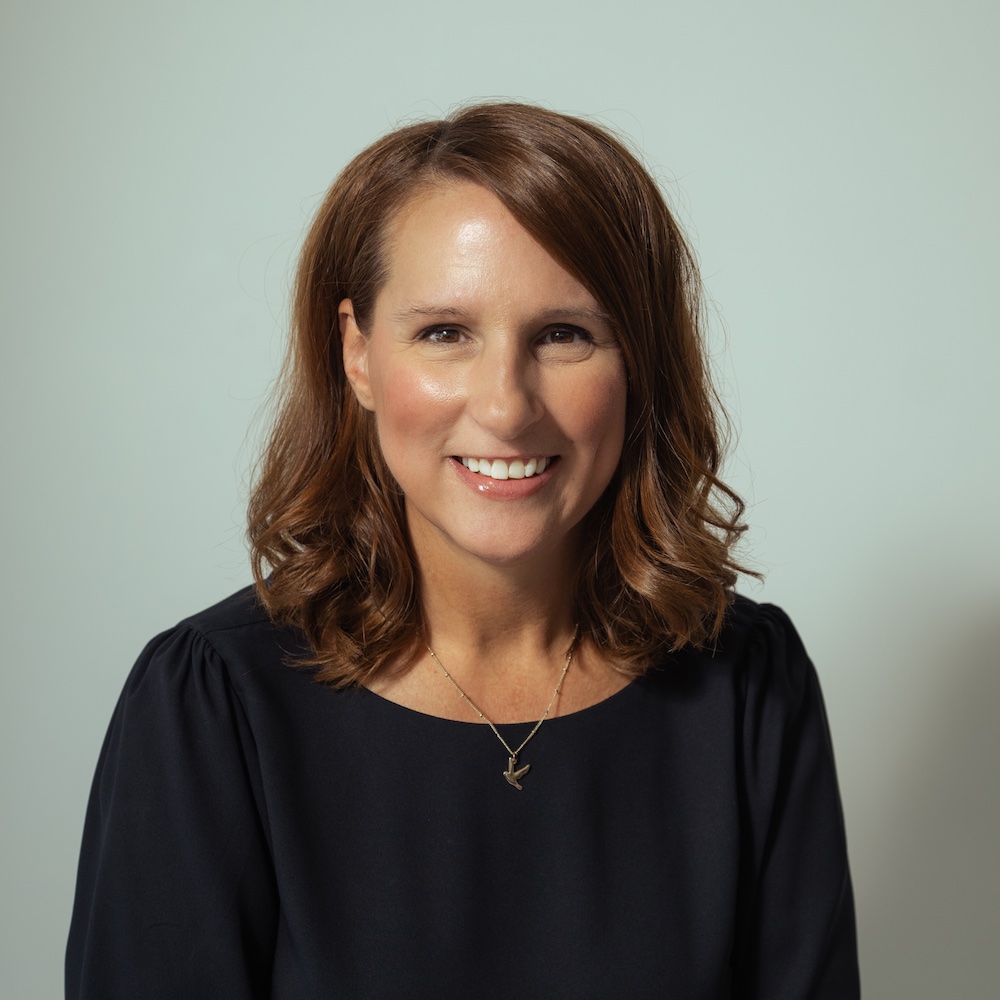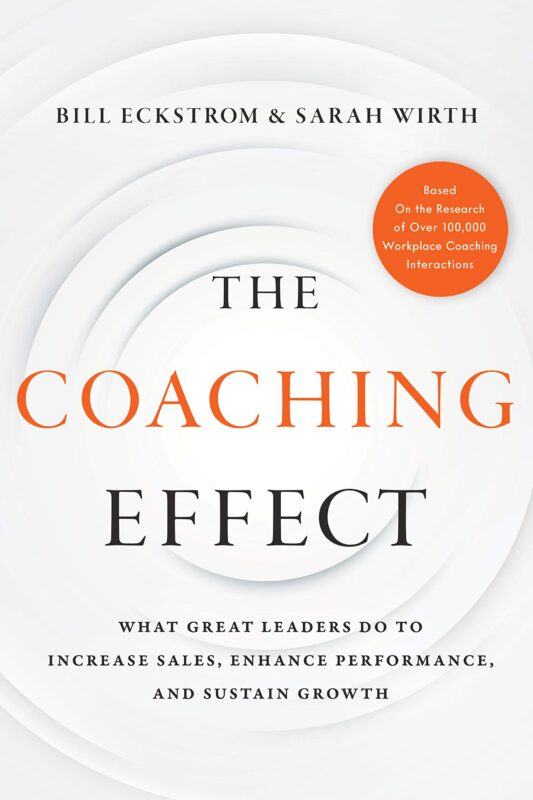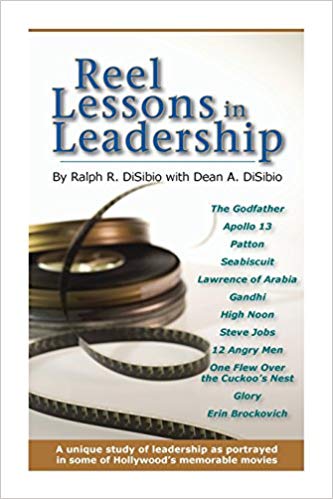
Sarah Wirth is President of Ecsell Institute, and co-author of the best-selling book, The Coaching Effect. Her life passion is understanding what makes people tick. Sarah has spent the last two decades researching, writing, and teaching about what the best leaders do differently. In this interview, Sarah starts the conversation with her affinity for pop culture and the lessons for leadership she finds in movies. She tells how Ecsell Institute started as training for sales leaders and expanded into helping leaders in other areas. Sarah and her team gather and analyze survey data to help leaders improve the performance of their organizations by improving their coaching.
Key Takeaways
[2:02] Sarah’s team members say she is a pop-culture guru. She likes movies, TV, books, and music, and she likes to find leadership lessons in them. She did a series on looking for leadership lessons in movies.
[2:28] Past guest Dean DiSibio wrote Reel Lessons in Leadership, where he talks about leadership lessons from movies.
[3:12] Sarah picks Moneyball as a movie with leadership lessons. The character Brad Pitt plays is trying to lead his team in a different direction, and lead it differently than anyone has ever led a baseball team. Jan likes Blues Brothers but would pick Succession (TV show). Jim would pick Ted Lasso (TV show).
[6:08] Jan and Jim once asked past guests, “How do you measure leader effectiveness?” That is the purpose of Ecsell Institute. They go to the people that are being led to measure leader effectiveness. Then they compare the results with measurable goals for that position and what the leaders are doing to reach the goals.
[7:25] Ecsell Institute looks at leaders that are achieving their goals versus leaders that are not. Then they look at how those leaders are leading differently, according to their team members. That gives Ecsell Institute an understanding of the behaviors of successful leaders.
[8:58] The Ecsell questions are behaviorally-based. For example, “When you have your one-to-one meetings, does your leader have you define action steps coming out of them? How often?” They are trying to find leadership behaviors to give recommendations to help others become better leaders. People can learn behaviors to emulate.
[11:57] Part of the evaluation is outcome-variable questions, such as whether you see yourself working here a year from now. How happy are you in your job? How much do you trust your leader? Would you recommend your team as a great team to work with? Sarah tells how transparency in sharing the information behind the decisions made has a huge impact on trust.
[13:37] The Coaching Effects Leadership Survey is consistent in terms of what it measures. How it applies to an organization is something Ecsell has a conversation about with the organization, in particular, how specific leadership traits fit into the company culture.
[15:06] Communication and transparency from Ecsell are key to getting employees to trust the survey and how it works. There is even a final question that is not reported to the client, “On a scale of one to 10, how honest were you in giving your responses to these questions?” Some respondents will put a five, especially in low-trust environments.
[17:39] Sarah recommends the Coaching Effects Survey for choosing which leaders to invest in. The high-rated leaders are the ones who are interested in being great at what they do. They are passionate about being good leaders. They’re the ones who want to learn more and improve. Others may have more room for improvement but high-performing leaders have more potential for improvement.
[19:42] A lot of times people get promoted into leadership opportunities because they were good individual performers. Sarah talks to the newly promoted leader and to their manager to understand, does this person have leadership capability? It’s a different skill set. You might get an underperforming manager while losing a great performer.
[20:40] Sarah recommends that managers ask their team members before promoting them, what is it that interests them about being a leader. If they talk about enjoying coaching and mentoring their peers, and helping others achieve success, that shows they are likely to have an aptitude for leadership. If they just want to move up or make more money, that doesn’t indicate an aptitude for leadership.
[22:35] Ecsell was founded to work with sales leaders. It expanded as clients wanted to apply the concepts to other leaders in their organizations. Sarah explains how sales leadership differs from other corporate areas. Salespeople are the athletes of the corporate world. They have to perform all the time. Their performance is measured differently. They have emotional highs and lows. They need coaching.
[23:50] If you have a sales coach that does not manage the salespersons as much on the emotional level as on the task level, you’re going to lose out on so many opportunities to help salespeople perform.
[24:07] Past guest Dan Pink made the point that salespeople are not motivated by money but by winning. Money is how they keep score. Sarah agrees with this. In an 18-month sales cycle, we have to find different ways to tap into that motivation to perform. A good coach can do that. The monetary goals alone will not drive the behavior.
[25:21] Sarah believes it’s a disadvantage for a CEO not to have a sales background. However, a good CEO can learn about sales motivation. Sales teams suffer when they are overmanaged and under-coached.
[27:22] One of the measurements of the Coaching Effects Survey is how consistent that leader is in their behavior. The best leaders are a lot more consistent with their team members. The consistency extends to one-to-one meetings, giving feedback, talking about the team member’s career, and following through on commitments.
[29:37] When you are consistent as a leader, it makes the moments when you are inconsistent stand out more. Your team members are going to want to dig into it and understand it. If you are very consistent, then, when there’s something off, they might think there’s a pretty good.
[30:59] Sarah would coach the importance of consistency starting with questions. She would ask a team member who was behaving inconsistently, “What’s your understanding of what you are supposed to be doing here?” They may not understand the expectations around their role.
[31:31] Once she knows the expectations are aligned, Sarah would say “Let’s look at the data. Here’s where you’re meeting it, here’s where you’re not. Help me understand the gap. What’s holding you back from being able to achieve this?” They may need more training or a better understanding of the expectation.
[32:04] Sarah doesn’t want to make assumptions about what’s causing the inconsistency. She wants to diagnose the issue with the person and come up with the problem and ideally, to come up with solutions together about what they can do differently. They buy into the solution, instead of being told what to do to fix their problem.
[33:20] Sarah shares a client experience. A senior leader had thought the managers were doing one-to-ones, feedback, and career discussions, but they weren’t. The data showed clearly that despite the best intentions of the managers, they were not getting the coaching done. The disconnect between the leader’s perception and the reality in the eyes of the team members was a surprise to the leader.
[34:08] So the leader made it a clear expectation. She made their coaching activities and the expectation to do them as part of their year-end bonus structure. If the leaders weren’t doing these coaching activities at a certain percentage, they would lose part of that compensation at the end of the year. The managers took it seriously, raised their coaching, and the company had its best two sales years so far.
[35:01] The managers bought into it because they saw their teams were achieving more. They were motivated to keep coaching, even if they weren’t measured anymore, because they saw that it matters.
[35:54] Sarah explains the reports Ecsell Institute produces for clients. For every question on the survey, they provide your result, company benchmarks, and top-performer benchmarks, so you can see how you are doing compared to your peers and to the best leaders.
[36:56] The data shows, if you don’t have a strong relationship with your coach, at the core of that coaching dynamic, everything else — accountability, the type of feedback that they give you, how much they push you — all those other things kind of fall on deaf ears. They don’t know that you care and that you’re doing it in their best interest.
[37:30] Sarah shares her thoughts on ChatGPT and artificial intelligence. There are certain things that can be helpful in the coaching process, that we can allow artificial intelligence to do, but at the core of it, the human relationship is so essential to helping somebody perform and grow. Sarah doesn’t think there’s a way that you replace that.
[37:58] There’s always going to be such an important role that good leaders play because they’re the only people that can establish that human connection.
[38:18] Jan just asked ChatGPT “What are the best questions to ask in a 360 for leaders?” In two seconds it responded, “How do I come across to others, in terms of my leadership style?” and “What do you think I need to do to build more trust with my team?” It’s going to be a great tool. Jan thinks it will help us get better. Please listen to Episode 348 for an interview with “guest” ChatGPT!
[39:37] Jim heard that at least at one time, if you were underperforming in an Amazon warehouse, a robot would come up to you and terminate your employment. That robot “definitely had a sign taped to its back!”
[40:23] Sarah’s closing thoughts: “At Ecsell Institute, we are continuing to study leadership across the board and one of the places that we’re starting to study it is in high school and looking specifically at leadership from teachers and coaches and how it impacts kids in the classroom or on the court. … So be watching for more research that we have coming out on that, too.”
[41:03] Closing quote: Remember, “Each person holds so much power within themselves that needs to be let out. Sometimes they just need a little nudge, a little direction, a little support, a little coaching, and the greatest things can happen.” — Pete Carroll, Seattle Seahawks
Quotable Quotes
“My team members at Ecsell always like to say that I’m a bit of a pop-culture guru. I like my movies, I like my TV, I like my books, I like my music, and I like to find leadership lessons in them. I did a whole series once on how… Share on X “There’s a scene at the end where they said, ‘The first one through the wall always gets bloodied.’ And I think that’s sometimes very true around leaders that are trying to be innovative and do different things. So [Moneyball] is a… Share on X “There are many models of leadership in Pulp Fiction.” Share on X “The major way that we measure leader effectiveness is by going to the people that are being led. We feel that is the only way. If you want to get feedback and insight into whether or not somebody’s a good leader, ask the people… Share on X “Sometimes we just study the outcomes but we don't know necessarily what’s the role that that leader plays in achieving those outcomes.” Share on X “The leaders that are more highly rated in terms of their team members trust them, what behaviors are they exhibiting differently than the leaders who have low trust ratings? … How much information you share behind decisions that… Share on X “As leaders, we overestimate a lot how consistent we are because we tend to judge ourselves by our intentions and what our plans were. But others judge us by what our behavior actually was.” Share on X “If you don’t have a strong relationship with your coach, at the core of that coaching dynamic, everything else — accountability, the type of feedback that they give you, how much they push you — all those other things fall on deaf… Share on X “There’s always going to be such an important role that good leaders play because they’re the only people that can establish that human connection.” Share on X
These are the books discussed in our discussion with Sarah
Resources Mentioned
- Sponsored by: Darley.com
- Rafti Advisors. LLC
- Self-Reliant Leadership. LLC
- Sarah Wirth
- Ecsell Institute
- Dean DiSibio
- Pulp Fiction (movie)
- Moneyball (movie)
- The Blues Brothers (movie)
- Ted Lasso
- Succession
- Christian Anschuetz
- Dan Pink
- ChatGPT
- “Episode 348: Our Real Interview with Artificial Intelligence Sensation ChatGPT”





Great podcast. Sarah touched on some important coaching points.
Thanks Bill!